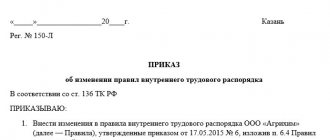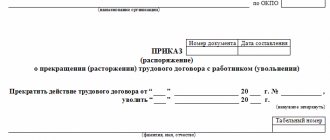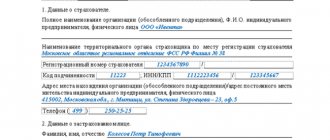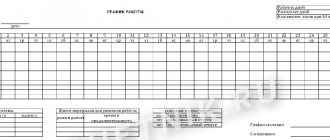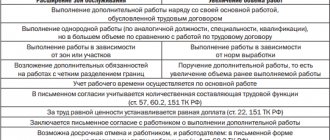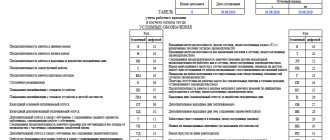Why do you need an order to change the work schedule?
The document in question is necessary to ensure the legality of changing the working hours of company employees.
Such a change in the regime in the general case must be agreed upon through the issuance and signing of internal corporate acts, involving the introduction of appropriate changes to the employment contract or internal regulations. The basis for a unilateral change in the working hours of employees, in accordance with Art. 74 of the Labor Code of the Russian Federation, there may be changes in the organizational or technological conditions of work for the company’s employees. In this case, the employer has the right to issue an order containing explanations regarding the objective reasons for changes in the employees’ work schedule.
If the employer cannot use the grounds specified in Art. 74 of the Labor Code of the Russian Federation, then in order to adjust the work schedule he must obtain the consent of the employees to whom it concerns. If this consent is not provided, then the employer has no right to issue an order changing the work schedule.
ConsultantPlus experts explained in detail how to change the work schedule and what risks such a change carries. To do everything correctly, get trial access to the system and go to the Ready solution. It's free.
What needs to be indicated in the order
There is no single approved form for an order of this type in the legislation. It is drawn up in any form, however, enterprises can use ready-made templates adopted by the company’s accounting policies. The order itself must contain the required details and points:
- document number and date;
- place of compilation (name of locality);
- Business name;
- name of the form;
- information about the essence of the adopted order, for example, “On the approval of a new working time regime”;
- grounds for issuing the order;
- a list of persons, responsible persons appointed to monitor the execution of the order (this may be a secretary or a specialist in the human resources department);
- position of the manager, his full name and personal signature.
If additional forms and forms are attached to the document, they are submitted as an Appendix to the order.
It is necessary to notify all employees of upcoming changes to working hours at least two months in advance. The notice is given to the employee personally against signature; for those who are missing, the form is sent by mail.
Order to change the work schedule: features of the document structure
An order to adjust employee work schedules must include:
1. Basic details - name, publication date, number.
2. Text block with justification for changing the work schedule, as well as a link to Art. 74 of the Labor Code of the Russian Federation, on the basis of the provisions of which the order is issued.
The justification may be, for example, the modernization of the production technology of goods, as a result of which the number of work shifts at the enterprise changes.
3. A text block with operative wording (“I order”) and a list of local norms introduced through an order.
4. A text block that records management’s orders to individual employees regarding ensuring the legality of the implementation of the provisions of the order.
In particular, in Art. 74 of the Labor Code of the Russian Federation states that the employer must offer other positions to employees whose work schedule changes.
5. A text block establishing the date and procedure for the order to come into force.
The document is signed by the head of the company. It is also necessary to familiarize employees with its provisions. Based on the order, new labor regulations (or additional agreements to employment contracts) are subsequently drawn up, which fix the changed work schedule.
If there is a change in the work schedule at the initiative of the employee, then the basis for issuing a similar order will be the statement of the initiator himself, that is, the employee.
Order on the operating hours of an enterprise sample and example of drafting
“APPROVED” General Director _______________________ _______________________ “___”__________ 202_ Order No. ___________
Order on the operating mode of the enterprise of the open joint-stock company "________________________________"
1. GENERAL PROVISIONS
1.1. This order determines the internal labor regulations in the open joint-stock company "__________________________" (hereinafter referred to as OJSC "___________"), the procedure for hiring and dismissing employees, the basic rights and responsibilities of employees and administration, working hours and their use, as well as incentive measures for success at work and responsibility for violation of labor discipline. 1 2. Internal labor regulations apply to all employees of OJSC “__________” and are intended to help strengthen labor discipline, rational use of working time, increase labor productivity and production efficiency. 1.3. These rules have legal force in those sections and insofar as they do not contradict the current Labor Code of the Russian Federation, as well as contracts, agreements and contracts with employees. 1.4. All issues related to the application of these Rules are resolved by the administration within the limits of the rights granted to it, provided for by the Charter of the organization. The administration of OJSC "___________" includes the General Director (or acting director) and his deputies. 1.5. Internal labor regulations are posted in a visible place.
2. PROCEDURE FOR HIRING AND DISMISSING EMPLOYEES
2.1. Workers and employees exercise the right to work by concluding an Employment Agreement with the employer. 2.2. When applying for a job, the employer is obliged to require from the applicant: 2.2.1. passport or other identity document; 2.2.2. work book, with the exception of cases when an employment contract is concluded for the first time or the employee starts working on a part-time basis; 2.2.3. insurance certificate of state pension insurance; 2.2.4. military registration documents - for those liable for military service and persons subject to conscription for military service; 2.2.5. a document on education, qualifications or special knowledge - when applying for a job that requires special knowledge or special training. 2.2.6. Employment at OJSC “__________” can be carried out with a probationary period lasting from 1 to 3 months. 2.3. An employment contract can be concluded for an indefinite period, as well as for a specific period, but not more than 5 years. 2.4. When concluding an employment contract for the first time, the work book and insurance certificate of the State Pension Insurance are issued by the employer. 2.5. For people starting work for the first time, a work book is created no later than 5 days after being hired. 2.6. Upon provision of the above documents, an employment contract is drawn up. 2.7. The employment contract comes into force from the moment it is signed by the employee and the employer. 2.8. Based on the employment contract, an order is issued, which is announced within three days to the employee against signature. 2.9. When an employee is hired or transferred to another job in the prescribed manner, the employer is obliged to: 2.9.1. familiarize the employee with the assigned work, working conditions, explain his rights and responsibilities; 2.9.2. familiarize him with these internal labor regulations, regulations relating to his work, which the employee must sign in the employment contract; 2.9.3. conduct induction and initial training at the workplace on safety precautions, labor protection and fire safety; 2.9.4. When applying for a job, the employee fills out a form, submits 2 photographs, and, if necessary, signs a liability agreement and an agreement on non-distribution of trade secrets. 2.10. Termination of an employment contract can only take place on the basis, in the manner and under the conditions provided for by the Labor Code of the Russian Federation. Termination of an employment contract is formalized by order of the director, which is announced to the employee against receipt. On the day of dismissal, the employee is issued a work book.
3. BASIC RIGHTS AND OBLIGATIONS OF EMPLOYEES
3.1. The employee is obliged to: 3.1.1 work honestly and conscientiously; 3.1.2. strictly comply with the provisions of the employment contract and the internal labor regulations of OJSC “__________”; 3.1.3. observe labor discipline (come to work on time, observe the established working hours, use all working time for productive work, promptly and accurately carry out orders from the administration); 3.1.4. comply with established labor standards; 3.1.5. comply with labor protection and occupational safety requirements; 3.1.6. comply with fire safety requirements provided for in the relevant instructions; 3.1.7. treat the property of the employer and other employees with care; 3.1.8. immediately inform the employer or immediate supervisor about the occurrence of a situation that poses a threat to the life and health of people, the safety of the employer’s property. 3.1.9. not to use for speeches and publications in the media both in the Russian Federation and abroad information received by virtue of official position and defined by a special document as a commercial (official) secret, the dissemination of which could harm both OJSC “__________” and its employees . 3.2. Employee rights: 3.2.1. to conclude, amend and terminate an employment contract in the manner and under the conditions established by the Labor Code of the Russian Federation, these internal labor regulations; 3.2.2. to present him with work stipulated by the employment contract; 3.2.3. to a workplace that meets working conditions and safety; 3.2.4. timely and full payment of wages in accordance with their qualifications; 3.2.5. for rest, ensured by the establishment of normal working hours, the provision of weekly days off, non-working holidays, paid annual leave; 3.2.6. for compensation for harm caused to an employee in connection with the performance of his job duties.
4. RIGHTS AND OBLIGATIONS OF AN EMPLOYER
4.1. The main responsibilities of the employer: 4.1.1. comply with laws and other regulatory legal acts, local regulations, including these internal labor regulations; 4.1.2. provide employees with work stipulated by the employment contract; 4.1.3. ensure labor safety and conditions that meet occupational safety and health requirements; 4.1.4. pay in full the wages due to employees within the terms established in the organization in accordance with the internal labor regulations and the regulations on the remuneration system, namely on the 15th and 30th of each month; 4.1.5. compensate for harm caused to employees in connection with the performance of their labor duties in the manner and under the conditions established by the Labor Code of the Russian Federation. 4.2. Employer's rights: 4.2.1. conclude, amend and terminate employment contracts with employees in the manner and on the terms established by the Labor Code of the Russian Federation, these internal labor regulations; 4.2.2. determine, change and clarify the labor responsibilities of employees of OJSC “__________”, based on production interests, taking into account employment contracts and labor legislation; 4.2.3. issue orders and give instructions that are binding on all employees of OJSC “___________”, and also demand their strict execution; 4.2.4. require employees to perform their job duties and take care of the property of the employer and other employees, and to comply with the internal labor regulations of JSC ____________; 4.2.5. bring employees to disciplinary and financial liability in the manner established by the Labor Code of the Russian Federation; 4.2.6. reward employees for success at work; adopt local regulations.
5. WORKING AND REST TIME
5.1. The start and end times of the break for rest and food are set (based on a 40-hour work week) as follows: start of work 9.00 break 13.00-13.30 end of work 1 7.30 days off - Saturday, Sunday. 5.2. On pre-holiday days, working hours are reduced by 1 hour. 5.3. Overtime is generally not permitted. 5.4. The order of granting annual leave is established by the management, taking into account the need to ensure the normal progress of work and favorable conditions for workers' rest. The vacation schedule is drawn up for each calendar year. Departments and laboratories of OJSC "____________" no later than December 15 of the current year provide vacation schedules agreed upon and approved by the director to the personnel department and brought to the attention of all employees. 5.5. Annual paid leave is 28 calendar days. 5.6. Leave for the first working year can be granted to an employee after 6 months. 5.7. It is prohibited not to provide annual paid leave for two consecutive years. Replacement of vacation with monetary compensation is not allowed, except in cases of dismissal of an employee who did not use the vacation.
6. RESPONSIBILITY FOR VIOLATION OF LABOR DISCIPLINE
6.1. Violation of labor discipline (i.e., failure to perform or improper performance, through the fault of an employee, of the labor duties assigned to him) entails the imposition of a disciplinary sanction in the manner and under the conditions provided for by the Labor Code of the Russian Federation. 6.2. For violation of labor discipline, including failure to comply with labor safety instructions, the administration has the right to apply the following disciplinary sanctions: 6.2.1. note, 6.2.2. reprimand, 6.2.3. dismissal for appropriate reasons, 6.2.4. Other disciplinary sanctions may be imposed. 6.3. Dismissal as a disciplinary sanction can be applied for the systematic failure by an employee, without good reason, to fulfill the duties assigned to him by the employment contract and these internal labor regulations, if disciplinary measures have previously been applied to the employee, as well as for absenteeism without good reason. 6.4. Absenteeism is considered absence from work without good reason (including absence from work for more than four hours during a working day), as well as appearing at work under the influence of alcohol or drugs. 6.5. Disciplinary action is imposed by the employer. For each violation of labor discipline, one disciplinary sanction may be imposed. 6.6. Before imposing a penalty, an explanation must be requested from the violator of labor discipline in writing. The offender’s refusal to provide an explanation is not an obstacle to the application of a penalty. 6.7. Disciplinary sanctions are imposed immediately after the discovery of the act, but not later than one month from the date of its discovery, not counting the time the employee was ill or on vacation. 6.8. An order to apply a disciplinary sanction is announced to the employee against signature within 3 days after the order is issued. 6.9. If within a year from the date of application of the disciplinary sanction the employee is not subjected to a new disciplinary sanction, then he is considered to have not had a disciplinary sanction.
7. ORGANIZATION OF Shift Work Schedule
7.1. The duration of working hours (a year is taken as the accounting period) should not exceed the normal number of working hours established by law; 7.2. The duration of weekly uninterrupted rest should not be less than 42 hours; 7.3. Remuneration to the Company's employees for work at night (from 10 pm to 6 am) is set at no less than 20 percent for each hour of work; 7.4. Work on non-working holidays is paid double; 7.5. Overtime should not exceed 4 hours for each employee for two consecutive days and 120 hours per year; 7.6. Overtime is compensated by additional days of rest; 7.7. At the workplace, without interruption from production, workers are provided with breaks for rest and nutrition with a total duration of 60 minutes during a 24-hour work shift. 45 minutes for a 12-hour work shift; 7.8. Working two shifts in a row is prohibited; 7.9. After approval of the shift schedule, it must be brought to the attention of employees no later than a month before it comes into effect.
8. ORGANIZATION OF Shift Work Schedule
8.1. At the workplace, without interruption from production, workers are provided with breaks for rest and nutrition with a total duration of 120 minutes for a 24-hour work shift, 60 minutes for a 12-hour work shift.
9. OTHER CONDITIONS
9.1. Employees of OJSC "_____________" enjoy all types of state social insurance. 9.2. The administration has the right to introduce new or change existing conditions of remuneration, while notifying employees no later than 2 months in advance. 9.3. Additional payments and compensations and the procedure for providing them to employees are established by the administration. 9.4. All employees must be familiar with the internal labor regulations of JSC "___________". 9.5. These internal labor regulations come into force from the moment they are approved by the General Director of OJSC ____________.
Human Resources Department.
I have read the order ________________/________________/
"___" __________202_.
Where can I download an order approving a change in work schedule at the initiative of the employer?
On our portal you can download the completed form for this order.
Find out how to temporarily change the work schedule (mode) at the initiative of the employer in ConsultantPlus. Study the material by getting trial access to the K+ system for free.
Using our sample, you can fill out a similar document yourself based on your own data.
Results
In a number of situations, the Labor Code of the Russian Federation allows the employer to unilaterally change the work schedule of employees. The main local regulatory act within this procedure is the order to change the work schedule. It must contain the rationale for the employer’s corresponding decision, and also regulate how the company will comply with the requirements of Art. 74 of the Labor Code of the Russian Federation regarding the need to provide employees who do not agree with the new schedule with alternative positions in the company.
You can study other nuances of personnel management related to work schedules in the articles:
- “How to draw up a working time schedule correctly?”;
- “What does a shift work schedule mean according to the Labor Code of the Russian Federation (nuances)?”
You can find more complete information on the topic in ConsultantPlus. Free trial access to the system for 2 days.
How are you paid if your work schedule changes?
This is especially true for those who are temporarily assigned full-time work. That is, if the duration of each working day is increased separately.
A company can switch to another taxation system, for example, a simplified one. How to write a notification about the transition to the usn - read the link.
If the hours are extra, but do not count as overtime
This issue is resolved in part one, article 99 of the Labor Code. It says that overtime work receives the status if an employee performs it on the initiative of the manager, and if the process itself goes beyond the previously established working hours.
If a transition is made from part-time to full-time work, and the basis is an additional agreement, the additional hours are not considered overtime.
For example, if the company has a standard 40-hour work week . Then the work is not considered overtime if the additional hours fall within this standard.
